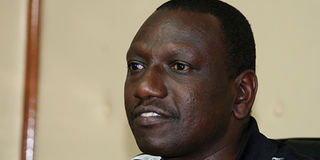Ruto loses bid to remove name from Kenya chaos report

Eldoret North MP William Ruto has lost a bid to have his name removed from a human rights watchdog report into the 2007/08 post-election violence May 4, 2012. FILE
Eldoret North MP William Ruto has lost a bid to have his name removed from a human rights watchdog report into the 2007/08 post-election violence.
Justices Mohammed Warsame, Cecilia Githua and Weldon Korir Friday dismissed Mr Ruto’s claims that he was not accorded a fair hearing by the Kenya National Commission on Human Rights, ruling that the MP did not show any evidence of malice.
The judges also dismissed his request to declare the KNCHR report null and void, ruling that the damage had already been done and they could not reverse what had already taken place.
“We think Mr Ruto is asking us to assist him capture a quarry that is already deep in the bush. Even if we are to grant the orders sought, it will not serve him any meaningful purpose,” ruled the judges.
They ruled that the report had been used extensively by third parties, and that it was the same relied upon by the Waki Commission of Inquiry into the post-election violence to reach its findings and make a recommendation.
The judges added that attacking the KNCHR report would be to curtail the investigations into the post-election violence and to abdicate public interest.
According to the judges, the commission did not make any decision that Mr Ruto was responsible for the violence but only mentioned that he participated and recommended further investigations against him.
They agreed with the commission’s submissions that the application was misconceived and defective since the report does not contain any decision that Mr Ruto was involved in the planning of the violence, nor does the report reach any conclusion of his guilt.
They accused Mr Ruto of filing the application too late after the report was released and that he did not offer any explanation as to why he did not file the case immediately the report was released in August 2008.
On the MP's claims that he was not given an opportunity to access evidence or witnesses, the judges ruled that it was risky since the country was still volatile and had not stabilised as a result of the violence.
“It would have been risky to confront Mr Ruto with the names of the witnesses given the investigations were carried out after the National Accord was signed. The commission was not obliged to reveal names since it would have endangered the lives of others,” they ruled.
They defended the commission saying that it acted according to statutory law and in good faith to protect public interest.
They dismissed Mr Ruto’s claims that the commission targeted him, saying that the report did not target any particular individual and that there was no evidence to show it treated him differently from others mentioned in the report.
The MP had filed the application seeking an order to annul the report by KNCHR that he participated in the planning and organising meetings in Kipkelion, Mailing and Turbo where he allegedly incited the public against the Kikuyus and his political opponents.
He argued that the commission breached the rules of natural justice, acted in bad faith and contravened his legitimate expectations, and that their conclusion had no basis in fact, equity and law.
The judges, however, ruled that the commission cannot be blamed since it acted on its own initiative to investigate the violations of human rights that took place during the post-elections violence and that the initiative did not warrant the rules of natural justice.
They ruled that Mr Ruto’s application came too late in the day, and that it was clear from the report he was summoned and actually appeared before the commission to give his evidence.
Mr Ruto is awaiting trial for crimes against humanity charges at the International Criminal Court (ICC). He is accused of committing crimes of murder, deportation, forcible transfer of populations and persecution against perceived PNU supporters in the Rift Valley during the post lection violence.
Some 1,133 people were killed and 650,000 uprooted from their homes following the disputed 2007 elections.
Deputy Prime Minister Uhuru Kenyatta, former public service head Francis Muthaura and radio presenter Joshua arap Sang are also due to stand trial at the ICC for the same or more charges.




